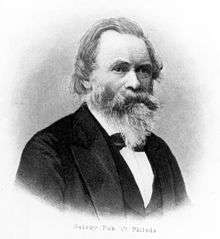Benjamin Bannan

Benjamin Bannan (1807–1875) of Pottsville, Pennsylvania was a journalist and political economist. Bannan is best known for his work as editor of the Miners’ Journal. The Miners’ Journal reflected Bannan’s belief in the Whig and then Republican ideology with which he closely identified. Bannan’s connection to the anthracite coal region of Pennsylvania affected his political affiliation and career, as he advocated tariff protection for US industry and internal improvements.[1]
Early life
Benjamin Bannan was born into a farming family. When Bannan was eight years old, his father died, leaving his family to tend to the farm. Bannan only attended school for two years.[2]
Bannan was inspired to become a printer and editor after reading the Village Record, which his teacher subscribed to. At the age of 15, he learned the printing business at the Berks and Schuylkill Journal. With time, Bannan was asked to become a partner and associate in the business.[2] Eventually, he traveled to Pottsville in April 1829 where he purchased the Miners’ Journal, which he owned for over forty years.[1]
Political career
Though not a politician himself, Benjamin Bannan became a spokesman for the Whig party in Schuylkill County. After the collapse of the party, he continued to go against the Democrats and thus identified as Republican. To align with his political affiliation, Bannan ran the Miners’ Journal as a “leading Whig, nativist, and Republican newspaper”. Bannan was also heavily influenced by the writings of economist Henry C. Carey.[3]
Bannan was an advocate of what historian Eric Foner has dubbed the “free labor ideology" of the nineteenth century. The ideology was built upon the belief that social mobility was an inherent aspect of economic expansion. Labor, then, “embraced all producers of wealth”, an economy centered on independent farms and small shops, rather than factories. In this ideology, capitalism and labor worked in harmony and were not opposing factors. The Miners’ Journal was a play on the “free labor” ideology: the journal was for the small operating class, not the mine workers.[4]
To Bannan, the ideal society had an independent middle class made up small entrepreneurial businesses. In the anthracite region he lived in, he saw this as coal operators. Bannan saw the possibility for upward mobility by starting as a laborer, moving to a miner and finally taking the next step to a property holder.[5]
Bannan and Irish immigrants
Bannan held a strong aversion to Irish Catholic immigrants who generally held the laborer jobs, tended to support the Democratic Party, and consumed alcohol, which offended the teetotaler.[4]
In 1857, Bannan mentioned the Molly Maguires in an issue of the Miners’ Journal, in which Bannan linked the group to violence in the area. It is among the first known public references to the secretive group in the US. Bannan made the argument that if more immigrants came, society would be threatened. Though Bannan made the claim, there were no proven accounts of violence from the Molly Maguire until 1862[4][6]
Other contributions
Bannan was an early advocate of a national currency.[2] Additionally, Bannan campaigned for tariff protection for US manufacturers.[1]
Coal, Iron, and Oil
In addition to Bannan’s newspaper publication of the Miners’ Journal and contributions to government policies, Bannan co-authored Coal, Iron, and Oil with Samuel Harries Daddow. The book deals with mineral resources and the manufacturing industry. Coal, Iron, and Oil is said to have been one of the most expensive single volume book published at the time.[2][7]
Further reading
- A concise bio at Aphilsoc
.org - Biography at Berks
.pa-roots .com - Biography at USGW Archives
- Biography at Magoo
.com
References
- 1 2 3 ""Benjamin Bannan, " Berks County PAGenWeb Project,".
- 1 2 3 4 "History of Schuylkill County". W. W. Munsell & Company. 1881.
- ↑ Kenny, Kevin (1998). Making Sense of the Molly Maguires. Oxford: Oxford University Press. p. 74.
- 1 2 3 Kenny, Kevin (October 1994). ""Nativism, Labor, and Slavery: The Political Odyssey of Benjamin Bannan, 1850-1860,"". The Pennsylvania Magazine of History & Biography 118, no. 4.
- ↑ Foner, Eric (1995). Free Soil, Free Labor, Free Men (reprint ed.). Oxford.
- ↑ Wallace, Anthony F.C. and Paul A. W. Wallace,. "Social and Technological Change". Historical Society of Schuylkill County.
- ↑ Bannan, Benjamin and Samuel Harries Daddow,. 5-6. "Coal, Iron, and Oil, (Pottsville: Benjamin Bannan, 1866)" Check
|url=value (help).